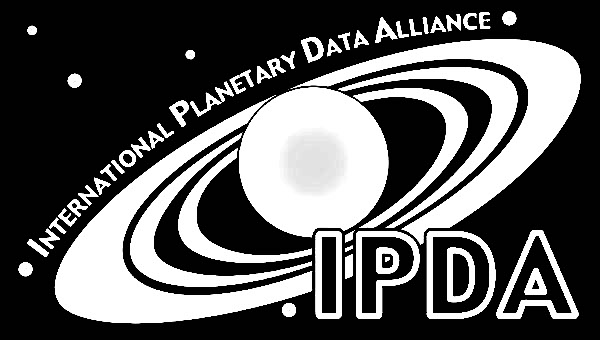The following is the proposed resolution of the 37th COSPAR Scientific Assembly from Commission B on International Access to Planetary and Lunar data.
Membership
Who is represented? See below.
How is IPDA structured? IPDA is managed by a steering committee that meets annually. Projects dealing with well-defined tasks with a leader and team are identified. Detailed procedures for electronic communication to complete the defined project have been established. Long-standing committees are minimized and only established as necessary (i.e., a technical group to define, retain and integrate the accomplishments of Projects).
How is it supported? This organization depends on support of participants by their individual agencies and is based on recognition that this effort is needed.
How do agencies/institutions join? The agency/institution contacts the chair of the Steering Committee and the committee accepts membership.
Overview of the International Planetary Data Alliance
The IPDA’s emphasis is to ease discovery, access and use of planetary data by world-wide scientists regardless of which agency is collecting and distributing the data. Ensuring proper capture, accessibility and availability of the data is the task of the individual space agencies. The IPDA is focusing on developing an international standard which allows the following capabilities: query, access and usage of data across international planetary data archive systems.
While, trends in other areas of space science are concentrating on the sharing of science data from diverse standards and collection methods, the IPDA shall concentrate on promoting standards which drive common methods for collecting and describing planetary science data across the international community. Such an approach will better support the long term goal of easing data sharing across system and agency boundaries. An initial starting point for developing such a standard will be internationalization of NASA’s Planetary Data System standards.
The IPDA has two core goals:
- Developing international standards for data archiving
- Developing interoperability protocols for allowing data sharing among planetary data systems.
Why do we need this?
With increasing international participation in planetary and lunar exploration it is desirable that mutual access to the data captured in international scientific archives be improved, to:
- Reduce cost of archiving and distributing science data
- Assure reusability of of science data across time and agency/mission/instrument boundaries
- Make it simpler to coordinate archiving processes and plans
- Simplify and encourage the access to planetary science data from other scientific communities
- Achieve the maximum possible exploitation of scientific data
In order to achieve this within the limitations of data preparation budgets and local requirements and constraints, it is necessary that the international community utilize common data standards and develop mutually shared access tools.
The primary objective of this resolution is to emphasize the need for collaborative efforts to develop mutual data standards and access tools.
A secondary objective is to acknowledge the preliminary groundwork that has been achieved by the International Planetary Data Alliance (IPDA) and provide a place to coordinate the IPDA activity under the COSPAR body.
Explanatory Notes:
- IPDA standards should be integrated into the initial development of mission data pipelines.
- Mission and instrument teams must have adequate validation periods to calibrate and document the data before it is made accessible to the scientific public.
- We must not impose an unworkable load on participating data archiving facilities.
The Resolution
Taking into account that:
- It is in the general interest of the planetary science community that data archives be made as widely accessible as possible.
- Existing technology via the world-wide web supports efficient and cost effective access.
- Sustained sequential missions by specific agencies are rare and limitations imposed by gaps in temporal coverage, spatial resolution and frequency coverage can be partially overcome by sharing of international databases.
- The scientific yield that can be achieved through open international access and collaboration will be greatly enhanced..
COSPAR resolves that there is a need for common data standards and tools to enhance international access to data acquired by planetary and lunar missions and that the International Planetary Data Alliance (IPDA) be recognized as the lead organization to coordinate efforts to achieve this.
COSPAR recommends that:
- The IPDA continue its efforts to extend interoperative capabilities and common access tools and to develop sufficient commonality in the IPDA data model to achieve interoperability and ease of scientific use from public planetary science archives.
- Data obtained with publicly funded planetary and lunar missions be similarly formatted, based on the common data model, including metadata, to make them scientifically valuable.
- All scientific data from planetary and lunar missions be promptly made publicly available, consistent with individual agency policies on validation periods and periods of exclusive use.
- Funding agencies provide encouragement and adequate support to enable data produced by instruments and missions they fund to be deposited in recognized archives.
